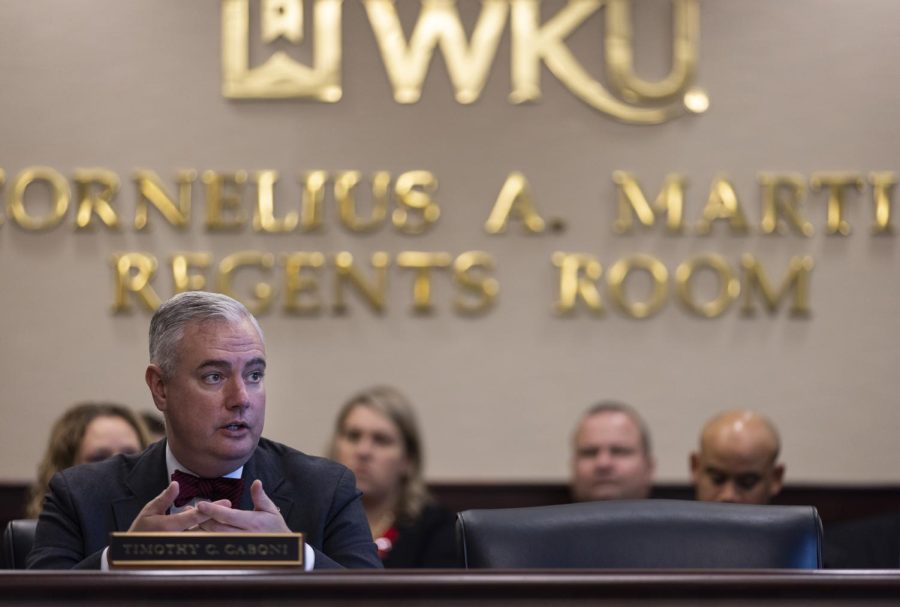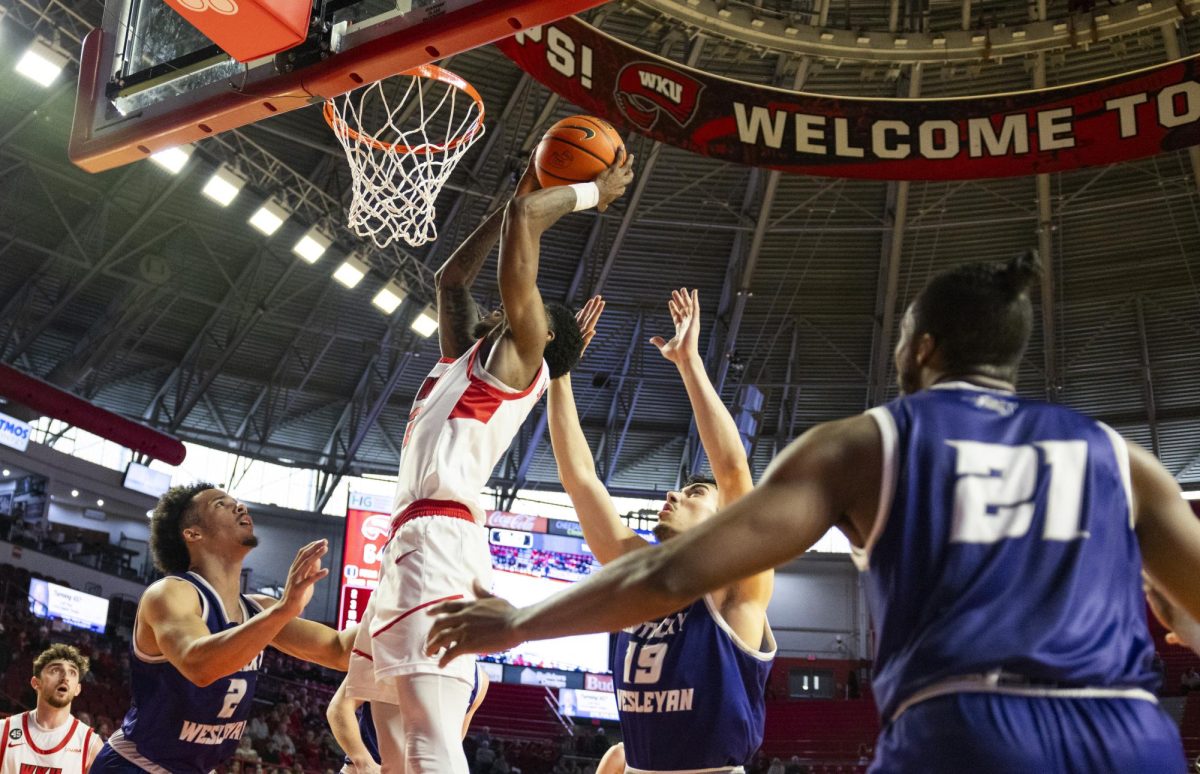Board of Regents discusses academic program suspension, WKU’s accreditation
WKU President Timothy C. Caboni sits at the Board of Regents meeting in the Regents Room inside Jody Richards Hall on Thursday, Dec. 8, 2022.
January 20, 2023
Editor’s Note: This story has been updated with further clarification.
During the roughly two hour long meeting, the Board of Regents discussed the suspension of an academic program, the return to pre-COVID budget and the university’s accreditation.
The Academic Affairs report covered the approval of the suspension of the Strategic Sports Communications Graduate Certificate due to the low enrollment, as the Herald previously reported.
Provost Bud Fischer said the decision to suspend the certificate program was made with faculty and the program head.
WKU President Timothy Caboni said, during the meeting, that the decision was a positive sign of the university’s growth and commitment to academic quality.
“As we make strategic decisions as an institution going forward, one of the important things for us to be able to do new things is that we have to stop doing small things,” Caboni said. “It is an indication of an institution that is dynamic and forward thinking when it stops doing some things. We don’t have unlimited budgets.
“This is a great example of faculty…taking a look at their portfolio and saying ‘if this isn’t working, what else can we do that is in demand?’ So, I think this is a good sign, not a bad sign,” Caboni added.
The motion was approved unanimously by the board. The suspension will take effect in spring 2023. Current students enrolled in the program will be allowed to finish and obtain the certificate.
After the Academic Affairs Committee finished its report, the Finance and Budget Committee, chaired by Jan West, spoke about the university’s budget.
The budget report was given by Susan Howarth, Executive Vice President for Strategy, Operations and Finance, who said WKU is on track to return to pre-COVID numbers.
“Overall, it’s a good news report,” Howarth said. “I don’t think there are any red flags.”
According to the report, so far in fiscal year 2023 total revenue accounts for 66% of the budget, this is slightly lower than the 71% reported last year. The total expenses are listed as 53% which is the same percentage reported in last year’s budget.
Total Personnel expenses, including things like wages and benefits, saw a one percentage point from 46 to 47%. This is primarily due to the raises and includes the one-time payments.
Expenses like utilities, travel, supplies and operating, and maintenance have all seen slight increases due primarily to people returning to campus, Howarth said.
“We are returning to pre-COVID spending levels,” Howarth said. “It’s going to be ever so important that we monitor that really, really closely. Basically [we’re] spot on to where we were last year.”
Caboni said the official enrollment numbers are expected to be finalized “within the coming weeks,” Caboni said. He said he anticipated positive numbers.
“Our entire campus is focused, like a laser, on student success and retention,” Caboni said. “In the coming weeks when we report out the fall to spring retention numbers we’re going to have a lot to celebrate.”
Towards the end of the meeting, Caboni, along with Beth Laves, Assistant Provost, Director for Accreditation & Academic Programs and SACSCOC Liaison, gave a brief presentation concerning the reaccreditation of WKU.
Caboni said there was no more important process that the university would go through.
“It happens once per decade and it is crucial for us to be successful in the process,” Caboni said.
The accreditation will happen over the next few years, and will be done in conjunction with the Southern Association of Colleges and Schools Commission on Colleges.
“During the next couple of years essentially every part of the institution will be touched by this process,” Caboni said.
SACSCOC was founded in 1917 and covers eleven states from Texas to Virginia. It was founded with the mission of “assuring the educational quality” and to improve academic effectiveness.
“The Southern Association of Colleges and Schools Commission on Colleges is the body for the accreditation of degree-granting higher education institutions in the Southern states,” SACSCOC’s website states.
While Laves said a more appropriate name was reaffirmation rather than reaccreditation, she said they will be looking for three basic principles including the appropriateness of the university’s mission statement and the university’s objectives.
Laves laid out the plan for the next three years, ending in 2025. Beginning this semester a writing team will be assembled and will “begin putting together narratives.” The following summer and fall of 2023 will consist of making a first draft and data collection.
The “on-site review” is scheduled for Feb. 24 through 27, 2025, according to Laves.
Two items listed under the Academic Affairs that were previously included in the agenda were pulled, one as late as the Wednesday before the meeting.
According to Academic Affairs Chair Regent W. Currie Milliken, the items that were pulled were the Student Code of Conduct and the admission policy previously reported by the Herald.
“There was more work to be done,” Miliken said. “I’m assuming it’ll be on the next agenda.”
The meeting ended on a somber note as Caboni and SGA President Cole Bornefeld took a moment to speak about Gregory McKinney, who passed away on Dec. 30, 2022. McKinney was the first Black regent when he was appointed in 1981.
“He was courageous,” Caboni said. “He was a trailblazer and his actions paved the way for future Hilltoppers.”
This was the first committee meeting for the Board of Regents this semester. The next committee meeting is scheduled for April 14, and the bigger quarterly meeting is planned for March 3.
Administration reporter Michael Crimmins can be reached at [email protected].













